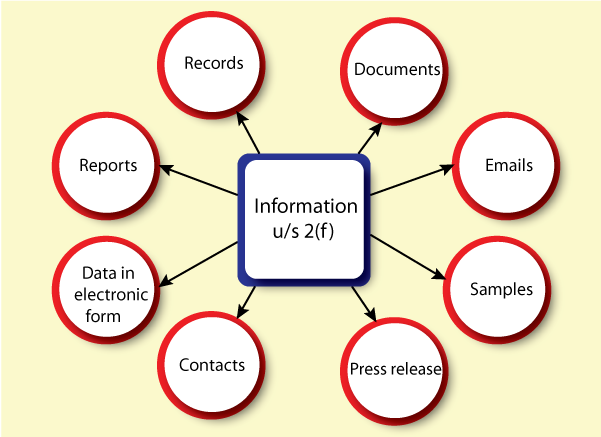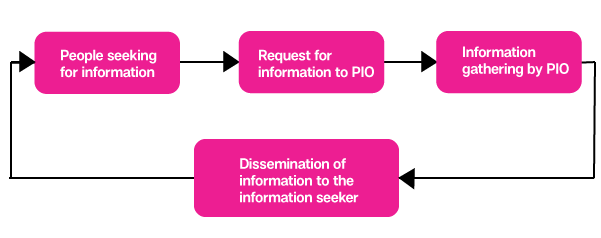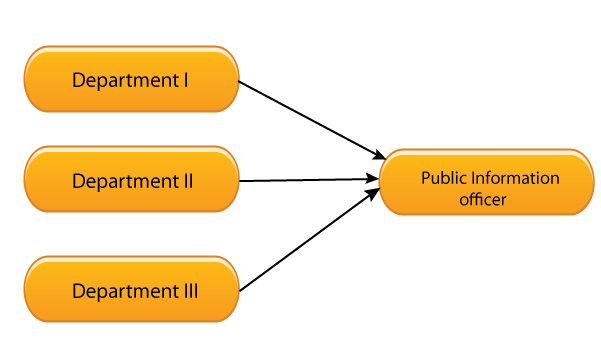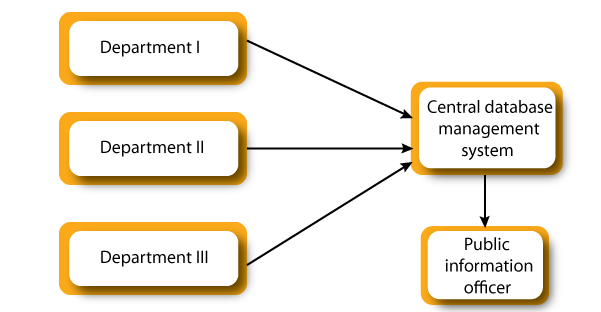Probity in Governance: Right to Information
It has been emphasized by many experts that Good governance seems to be a substitute for effective government in the sense that the basic government functions are 'developmental' whereas the fact remains that all governments carry out several more important extra developmental functions. Right to information is vital mechanism for successful governance practices. The right to information provides a helpful tool, which every person in India can use to find out information to enhance their life. Information indicates any material in any form including records, documents, memos, e-mails, opinions, advices, press releases, circulars, orders, logbooks, contracts, reports, papers, samples, models, data material held in any electronic form and information relating to any private body which can be accessed by a public authority under any other law for the time being in force. According to Article 19 of the Universal Declaration of Human Rights, "Everyone has the right to freedom of opinion and expression; this right includes freedom to hold opinions without interference and to seek, receive and impart information and ideas through any media and regardless of frontiers."
Right to Information includes the right to
- Inspect works, documents, and records.
- Take notes, extracts or certified copies of documents or records.
- Take certified samples of material.
- Obtain information in form of printouts, diskettes, floppies, tapes, video cassettes or in any other electronic mode or through printouts.
Global implementation of right to information act: (Source: www.freedominfo.org)
|
Country |
India |
USA |
UK |
Japan |
|
Attributes |
||||
|
Title of act |
Right to information act |
Freedom of information act. |
Freedom of information act |
Freedom of information act |
|
Date of enactment |
15 June 2005 |
4July1966 |
30 Nov. 2000 |
May1999 |
|
Date of implementation |
12 Oct. 2005 |
4 July 1967 |
Jan 2005 |
April 2001 |
|
Time of implementation |
4 Month |
1 year |
4 year |
2 year |
|
Delivery of information |
30 day |
20 day |
20 Day |
30 Day |
In Indian context, Right to Information Act 2005 commands timely response to inhabitant requests for government information. It is an initiative taken by Department of Personnel and Training, Ministry of Personnel, Public Grievances and Pensions to provide a RTI Portal Gateway to the citizens for quick search of information on the details of first Appellate Authorities, PIOs etc. amongst others, besides access to RTI Right to Information related information / disclosures published on the web by various Public Authorities under the government of India as well as the State Governments. The Act applies to all States and Union Territories of India except Jammu & Kashmir. Under the provisions of the Act, any citizen may request information from a "public authority" (a body of Government or "instrumentality of State") which is required to reply expeditiously or within thirty days. The Act also requires every public authority to computerise their records for wide dissemination and to proactively certain categories of information so that the citizens need minimum recourse to request for information formally. The first application was given to a Pune police station. Information disclosure in India was restricted by the Official Secrets Act 1923 and various other special laws, which the new RTI Act relaxes. It codifies a fundamental right of citizens.
Major objective of the Right to Information Act:
The elementary objective of the Right to Information Act is
- To empower the citizens
- Promote transparency and accountability in the working of the Government
- Contain corruption, and make our democracy work for the people in real sense
Right to Information under the Act, 2005
Under this act, people have rights to search information from a public authority which is held by the public authority or which is held under its control. This right includes inspection of work, documents and records; taking notes, extracts or certified copies of documents or records; and taking certified samples of material held by the public authority or held under the control of the public authority. It is significant that only such information can be supplied under the Act that is available and existing and is held by the public authority or is held under the control of the public authority. The Public Information Officer is not authorized to create information that is not a part of the record of the public authority. The Public Information Officer is also not required to provide information which require drawing of inference and/or making of assumptions; or to interpret information; or to solve the problems raised by the applicants; or to furnish replies to hypothetical questions. Under this act, resident has a right to obtain information from a public authority in the form of diskettes, floppies, tapes, video cassettes or in any other electronic mode or through print-outs provided such information is already stored in a computer or in any other device.
The information to the candidate should be provided in the form in which it is sought. However, if the supply of information sought in a particular form would unduly divert the resources of the public authority or may cause harm to the safety or preservation of the records, supply of information in that form may be denied. In some cases, the applicants assume the Public Information Officer to furnish information in some particular proforma developed by them on the plea that they have a right to get information in the form in which it is sought. It can be established that the provision in the Act simply means that if the information is sought in the form of photocopy, it shall be provided in the form of photocopy, or if it is sought in the form of a floppy or in any other electronic mode, it shall be provided in that form, subject to the conditions given in the Act. It does not indicate that the PIO shall re-shape the information.
Important sections under Right to Information under the Act, 2005

Some Information Searchers request the Public Information Officers to cull out information from some document(s) and give such extracted information to them. A citizen has a right to get 'material' from a public authority which is held by or under the control of that public authority. The Act does not require the Public Information Officer to deduce some conclusion from the 'material' and supply the 'conclusion' so deduced to the applicant. It means that the Public Information Officer is required to supply the 'material' in the form as held by the public authority, but not to do research on behalf of the citizen to deduce anything from the material and then supply it to him.
RTI provides information on the following schemes:
|
Individual requirement |
Community requirement |
|
Ration card |
Drinking water connection |
|
Certificates: Birth, Community,
Income, Death |
Street light |
|
Land ownership patta |
Public health and sanitation |
|
Retirement Pension |
Road maintenance |
|
|
Rural employment scheme |
Right to Information Act 2005 empowers every resident to
- Ask any questions from the Government or seek any information
- Take copies of any government documents
- Inspect any government documents.
- Inspect any Government works
- Take samples of materials of any Government work.
Steps in filing RTI Application
- Candidate can apply either hand written or electronically in a plain paper in English, Hindi, or local language to the concerned PIO (Public Information Officer) of the relevant department with a subject application under Right to information Act 2005.
- The application fee for the State of Tamil Nadu and central Government is Rs. 10. Court fees stamp, cash, government treasury, Demand draft, and postal order are accepted modes of payment.
- Send the application through Registered/Speed post with acknowledgement due so that it gets accepted at the other end.
- Do obtain acknowledgement on the photocopy of the application together with a receipt for the fee if personally application is filed.
- If the information sought for concerns the life or liberty of a person, the information shall be provided within 48 hours of the receipt of the request.
- The Public Information Officer should respond within 30 days of the receipt of the application. If no reply is received, file and appeal to the Appellate Authority of the same Department.
- The Appellate Authority gets another 30 days to respond after which the applicant can make second appeal within 90 days to the State Information Commission for the state government or Central Information Commission for central government departments as the case may be.
In case of information denial, RTI act recommends a fine of Rs. 250 per day to a maximum of Rs. 25,000 for 100 days over the concerned Public Information Officer.
Procedure to gather information:

Solution to overcome the problems due to the implementation of RTI Act, 2005:
It was observed that the personal information officer of those organizations where medium or low level of information technology is used, find lot of difficulties in collecting the information. To get the essential information they approach different department. However those organizations where all the information is stored at the central place called Central Database Management System, are not facing difficulties due to the implementation of RTI Act, 2005. Therefore, the integration of different department through the information technology was suggested by the personal information officer. Further it was also suggested that there should be fully dedicated executive as personal information officer and not as the executive with additional responsibility.
Personal information officer is unable to provide the required information to the information seeker on time, because they find difficult to access the required information from the concerned department. It was found through the personal interview that the organization where low or medium level of information technology is used, Personal information officer approaches the different departments to get the information and then it is given to the information seeker. It is a time consuming process.

To overcome issue of time consuming, the organization where high level of information technology is used, and all the information is at Central Database Management System, then information can be accessed by the different departments as well as the personal information officer. Central Database Management System is a system of storage of information from different department. It is advocated by the personal information officer that this system should be followed for the effective implementation of RTI Act, 2005.
Organization with effective of use of information technology in delivering right to information:

Necessity for RTI Legislation
RTI legal framework has immense importance in India as well as other countries. Information can support and strengthen poor societies to fight the circumstances in which they find themselves and help to balance the uneven power dynamics that exist between people downgraded through poverty and their governments. This apparent approach to working also helps poor communities to be visible on the political map so that their interests can be advanced. The right to information is central to the achievement of the Development goals. Right to information legislation acquired fundamental attention for the development of society. RTI laws gained importance as critical tools to combat corruption, and inefficiency. Although corruption exists in all cultures, it has a particularly malevolent effect on less developed countries. As also recognised by donor agencies, corruption discourages foreign investment and eats away at the budgets allocated to public procurements which enables basic infrastructure such as roads, schools and hospitals to be built. It also weakens political institutions by reducing public confidence in their operation. If unrestrained corruption continues to pollute a society or political system, it may ultimately lead to social interest due to the division it creates between those who have easy access to goods and services and those who remain excluded. It is the poor who always bear the greatest burden of a corrupt civilization.
Right to information legislation, is considered vital in advancing the development of society and in eliminating poverty. An unparalleled number of governments around the world with UNDP support are therefore increasingly enacting RTI laws. These laws vary extremely and often depend on the circumstances and specific campaigns, besides the development, and political context or the places where they are launched. The right to information can be guaranteed in a number of ways. Many nations provide for the right in their constitutions, usually by means of a broad statement guaranteeing the right of access to information. In the context of India the constitutional right to freedom of expression is specified (Article 19(1)(a)) and the right to information is inferred from this constitutional right.
RTI in India also received legal acknowledgement though judgements of the Supreme Court. Brick by brick the judiciary has built an impregnable edifice of the Fundamental rights providing thereby a semantic expansion and wholesome judicial connotation to RTI. In enactment of the need to provide RTI and enhance transparency, respective Governments made and attempts to amend the Official Secrets Act (1923). In 1996 the first major draft legislation on RTI was circulated by the Press Council of India. This draft originated in a meeting of social activists, civil servants and lawyers in Mussoorie and culminated in the Freedom of Information Bill, 2000 introduced in Parliament. Meanwhile instead of waiting for a central legislation, half a dozen states enacted their own laws on RTI.
RTI ONLINE: Department of Personnel & Training has launched a web portal which is called RTI online with URL www.rtionline.gov.in for all Central Ministries/Departments. This is a facility for the Indian citizens to file RTI applications and first appeals online to all Central Ministries/Departments. The prescribed RTI fees can also be paid online. Reply to the RTI applications and first appeals received online can also be given online by the respective PIOs/FAAs.
Advantages of Right to information:
Right to information is highly beneficial for citizens.
- Empowerment of the common man: Whole range of common man in the nation have been empowered by such an initiative in which they have got the full rights to be informed about anything that affects their life directly or indirectly and the responsible bodies have to answer them completely.
- Easy mode of spreading information rightfully: The Right to information has protected a very concrete and easy mode of spreading information of all kind in all form where apt information will be received by only the person concerned and this will in turn result in easy accessibility to information on one hand and time conservation of all.
- Protection of Information: Though, the selected people with selected queries will be entertained and informed rightfully and aptly, so this will lead to protection of information thereby protecting everyone from being wrongly or inappropriately informed or misinformed.
- Corruption will decrease gradually: It can lessen corrupt practices performed by government officials. If a person being asked for information on certain products and services and the answer has to be delivered by a competent and responsible authority then the chances of corruption will certainly be minimized. People will not have to bother about being cheated or victims of frauds and swindles.
Drawbacks of Right to information
In spite of benefits, right to information act also have some disadvantages.- Unnecessary chaos all over: Major disadvantage is that it create unnecessary disturbance and chaos over a newly incorporated plan just to create annoyance. Cases have been filed against fetching wrong information and asking for abrupt information from different officials at various levels and this creates nothing but an overall chaos.
- An extra burden to the Authorities: Since the authorized persons may already have loaded with works and tasks to be delivered at their end, this new act put more burden to be done and delivered.
- Multiple Public Information Officers (PIO): The government has appointed multiple PIO's. This results in running of citizens from office to office in search of correct PIO who can yield correct information.

